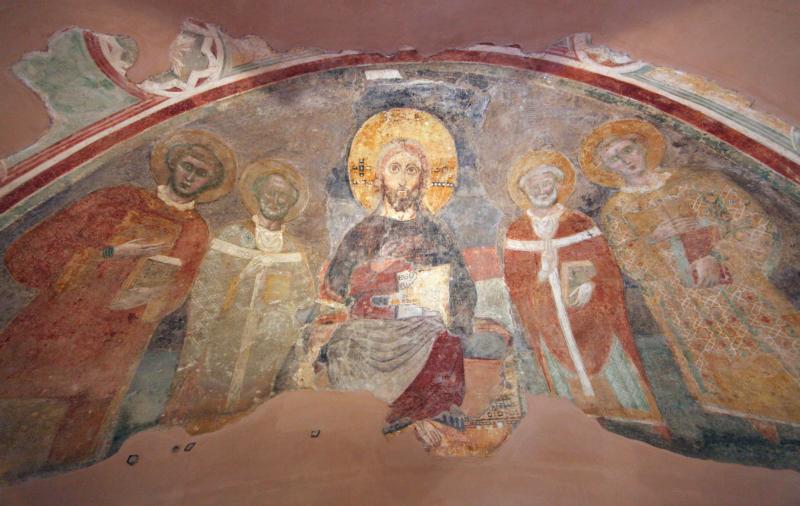
A fresco of Christ in Majesty, parts of it believed to date to the ninth century, is seen in the apse of the Church of San Pellegrino at the Vatican. As we journey through Advent each year we encounter a threefold sense of Christ’s coming: in history, in mystery and in majesty. (CNS photo/Paul Haring)
As we journey through Advent each year we encounter a threefold sense of Christ’s coming: in history, in mystery and in majesty.
The most concrete experience for many of us is a preparation for the Christmas season. This is when we celebrate and re-encounter the truth that Christ has come in history. We remember that the Messiah has come into our world and that salvation has been won.
(See a related video.)
During Advent, we can reflect more deeply on the continual revealing of Christ’s presence to us through his word and sacrament, and that he is with us whenever two or three are gathered, through mystery.
As Advent draws to a close we are invited to focus more and more on the preparation of our hearts to receive Christ when he comes again in glory, when his kingdom is fulfilled in majesty.
This final sense of waiting offers a sense of peace to the restlessness of our human anticipation. Our anxieties and yearnings for healing and wholeness in the brokenness and pain of our world is affirmed. There is yet more to come; creation is indeed groaning in travail (Rom 8:22).
[hotblock]
Our world is moving toward something more complete. Preparing for Christ to come in majesty illuminates for us that our sense of incompleteness is not misguided, but is a creative hunger through which God can further his work of salvation in our world.
We find this peace amid our discomforts and restless anxieties during the Advent season when we allow the first two senses of the coming of Christ — in history and mystery — to inspire our openness to the third — majesty.
The words of the psalmist for the Fourth Sunday of Advent remind us that we indeed need a savior and must return to God: “Lord, make us turn to you; let us see your face and we shall be saved” (Ps 80).
All that we embark upon disposes us toward God, and is God’s work in us. How do we prepare ourselves to allow God to turn us toward him?
The simple answer: Be open to wonder and surprise.
The prophet Micah reminds us of the constant paradox of our faith: The things of God rarely come from where they should be expected. Through Micah, the Lord proclaims: “You, Bethlehem-Ephrathah least among the clans of Judah, from you shall come forth for me one who is to be ruler in Israel” (Mi 5:1).
The Letter to the Hebrews reminds us that Christ’s sacrifice was him doing the will of God, offering his own will (Heb 10:5-10). This stands in contrast to many prevailing notions of what God desires us to offer him.
Both these truths (that God comes to us through seemingly insignificant or unexpected places and desires nothing more than ourselves) stand in accord with what the prophets proclaimed. However, since the prophets had to preach these realities, they clearly are not our natural assumptions.
In Luke’s Gospel, Mary models both an openness to receive God in unexpected ways and to act on the presence of Christ within her through the sacrifice of self.
Although she was in a vulnerable state as a young pregnant woman, she goes in service to her cousin Elizabeth in her need (Lk 1:39). Knowing the presence of Christ dwelling in her inspired actions. Mary’s act leads to Elizabeth knowing deeply the presence of Christ.
[tower]
If we are open to the truths of Christ’s first coming, we recognize how he abides with us now. If we act in response to his presence in our midst as Mary did, then we begin to prepare the way for his return in majesty.
We begin to offer the hope to our world that God desires to offer us. To anticipate Christ’s return is to live now in the light of what we know that world to be, even when what we see seems so broken and full of pain.
As we wait, we find peace in our restlessness when we let the world see what is already true: Christ has come and is with us now, and he will come again.
The Second Vatican Council teaches, “For after we have obeyed the Lord, and in his Spirit nurtured on earth the values of human dignity, brotherhood and freedom, and indeed all the good fruits of our nature and enterprise, we will find them again, but freed of stain, burnished and transfigured, when Christ hands over to the Father: ‘a kingdom eternal and universal, a kingdom of truth and life, of holiness and grace, of justice, love and peace.’
“On this earth that kingdom is already present in mystery. When the Lord returns it will be brought into full flower” (“Gaudium et Spes,” Pastoral Constitution on the Church in the Modern World, No. 39).
When we trust this we know that our restless anticipation need not riddle us with anxiety but frees us to live with open arms to welcome Christ who has come and is indeed coming again.
***
Father Golden, a Norbertine priest, writes from Albuquerque, New Mexico.
PREVIOUS: Making John the Baptist’s acquaintance in Advent
NEXT: Advent week 4: Final preparations foresee Second Coming



Share this story